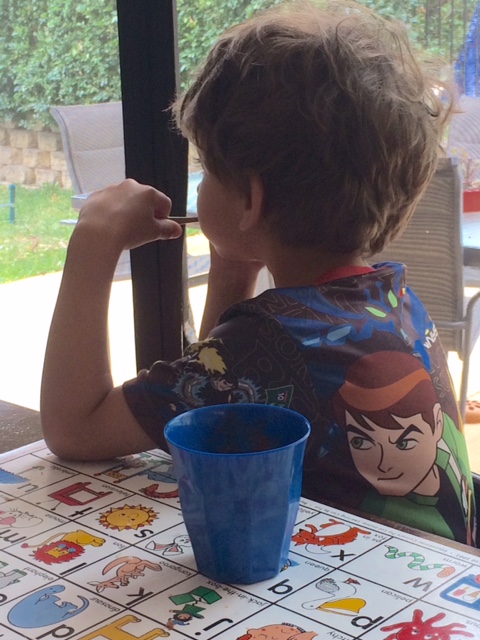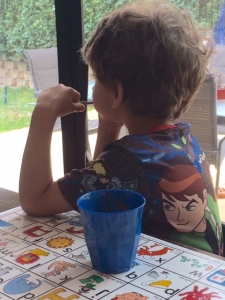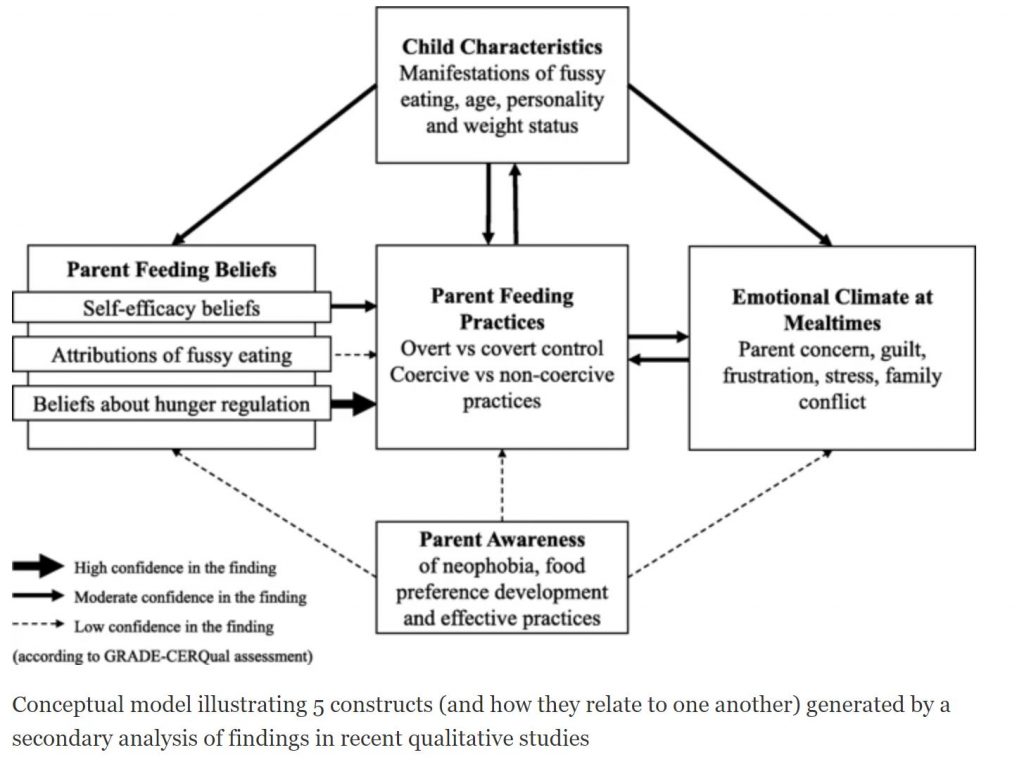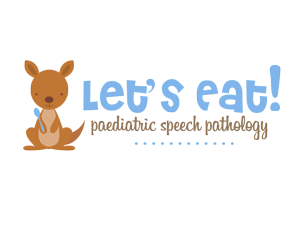
Today in our Let’s Eat Team meeting, Ashleigh and I talked about fussy eaters and mealtime stress. The phrase of “parents provide and children decide” is commonly used and forms the platform of how we work with families. This phrase was coined by Ellyn Satter in her Division of Responsibility. You can find more about the DOR approach here
We spoke about why
- Talking about the food at the dinner table is a NO-NO (e.g. Mum says “capsicum is crunchy and sweet you should try it”) – can you guess why? Because if you were a fussy eater and you didn’t eat capsicum then this would not be taken well, in fact, it would have felt like mum was pressuring you to eat.
Why don’t we like this? Because research is very clear here, a 2017 study (Jansen et al) found that parental pressuring has a counterproductive effect on fussiness – said simply – pressuring your child to eat a food they don’t want to eat doesn’t work.

- Supporting parental stress around the dinner table is important as an adjunct to feeding therapy. Lots of our parents know that we start feeding therapy with parent only sessions before we meet the child again (after the initial assessment).
Why? Because a 2020 systematic review of the research (Wolstenholme et al) found that negative emotions around the dinner reinforces fussy eating. Think about it, if the table you came to felt full of pressure and stress, it’s likely that you won’t feel like eating. Psychologists call this the fight flight freeze response and now 2020 research reinforces this.

For this reason, not only do we not talk about the food when it comes to the dinner table, we don’t use a learning plate here in the Let’s Eat! Speech Team.
We do talk about food and its sensory properties in feeding therapy and in cooking. What we don’t do is provide a nutrition lesson because it’s too abstract for little minds and it further guilts them. All food is delicious – I love hot chips with chicken salt as much as my patients! And I also enjoy crisp watermelon and crunchy capsicum. We do encourage food variety and exploring new recipes. But everything stops when it comes to the family table.

Why? Because family tables at dinner should be a time to connect as a family, to catch up on the day and to enjoy the experience. Not feel stressed as a parent because you’re watching your child like a hawke to see if they took a bite of food from their learning plate (no one likes to be watched when eating) and as a child, they don’t need to be constantly reminded that they should eat their vegetables.
In fact, while we are reviewing the research, a study in 2016 (Endelson et al) found that fussy eaters are prompted up to 48 times to take a bite, keep eating, etc. Imagine that? How would you enjoy your meal if you were reminded up to 48 times to take a bite?
Do you know what the researchers found as most effective in supporting a child to eat well? Parental modelling. So enjoy your capsicum, beans and carrot, in fact enjoy your chicken and potato as well as well as dessert if you have it! Chat with your child and over time, yes over time, your child might look at a new food.
For some restricted eaters who have underlying sensory and oral motor difficulties (I could bring up several other research studies around this topic alone) may need more support from an experienced feeding therapist. But the above rules still stand if you see us as your feeding team.
Wishing you a lovely week and most importantly, happy mealtimes
Val and Ash
Let’s Eat! Speech Pathology team
About the author of this blog post
Valerie Gent is an Australian based Speech Pathologist with 17 years experience in Paediatric Feeding. She has opened a private practice called ‘Let’s Eat! Paediatric Speech Pathology’ in 2013 for Newcastle based babies and children with feeding difficulties. Valerie is passionate about working in the area of paediatric feeding and special needs and has been involved in the teaching and training of Australian Speech Pathology University students and allied health professionals. Prior to starting her private practice, she worked in acute paediatric hospitals in neonatal intensive care units, feeding clinics and clinics for children with special needs for 10 years. You can find out more about Valerie Gent and ‘Let’s Eat! Paediatric Speech Pathology’ via her website www.letseatspeech.com.au and Facebook page www.facebook.com/LetsEatPaediatric SpeechPathology or email her on valerie.gent@letseatspeech.com.au
References
- Edelson, LR, Mokdad, C & Martin N Prompts to eat novel and familiar fruits and vegetables in families with 1-3 year old children: Relationships with food acceptance and intake. (2016) Appetite 1:99, 138-148
- Finnane, J.M, Jansen, E., Mallan, K.M and Daniels L.A (2016) Mealtime Structure and Responsive Feeding Practices are associated with less food fussiness and more food enjoyment in children. Journal of Nutrition Education and Behaviour, 49 (1)
- Jansen, P.W, De Barse, LM, Jaddoe, V, Verhulst, F. Franco, OH & Tiemeier, H. Bi-directional associations between child fussy eating and parent’s pressure to eat: who influences whom? (2017), Physiological Behavour, 176:101-106
- Wolstenholme, H., Kelly, C. Hennessy, M. & Heary Caroline. (2020) Childhood fussy/picky eating behaviours: a systematic review and synthesis of qualitative studies. International Journal of Behavioural Nutrition and Physical Activity. 17 (2)


There is so much to learn about feeding a “fussy” eater. Mine has ASD and ADHD and also have trouble finding food that he likes eating or even will try it. The struggle is real and becomes even worse when you hear that he is not putting enough weight on.
Thanks for the article.